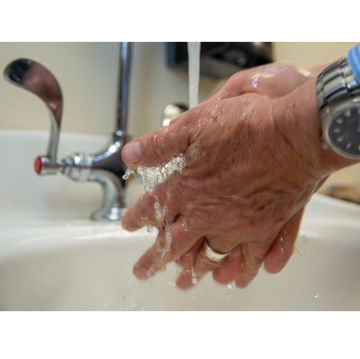New Mexico Approves Master of Science in Anesthesia Program at UNM

Sanitizing Primer
Now Is Not the Time to Relax Your Germ-Killing Practices
While we've all worked on practicing social distancing, washing hands and staying home as much as possible, Seth Daly, PhD, offers a few more reminders and tips to continue sanitizing your surroundings, even when your supply of Clorox wipes run out.
"If you save one life, it makes a difference, because so many of us are asymptomatic," says Daly, a post-doctoral fellow and research facilities manager for the Department of Pharmaceutical Sciences in the UNM College of Pharmacy.
He's coached his students on how to prevent the spread, and offers some everyday steps to keep COVID-19 from spreading.
No Recipe Required
Washing your hands with soap and water is much more effective than using hand sanitizer. It's a simple thing to do to keep everyone safe.
"Soap is the easiest and safest to use and it's the thing you can still buy in stores right now," Daly says.
Sing "Happy Birthday" two times while lathering your hands. Then turn the water on and rinse. Water temp doesn't matter (it's for your comfort). The soap is doing all the work, he says.
The other big habit to curb is to stop touching your face. When you feel the need to touch your face, scratch your nose or rub your eyes, press your fingers together as in a prayer position.
Daly hopes that when the pandemic ends, folks will continue to practice healthy hygiene. "When this is over, try not to touch your face and wash your hands more often," he says.
And remember to cover your cough and sneeze. "It's terrible that this (virus) is what's making people do it now," Daly says.
Running Essential Errands
Daly recommends choosing a hand that will be the designated "dirty" hand, most likely your right hand. This one will pick up items in the grocery store, gas up the car, etc. Keep your left hand in your pocket. Remember that from the moment you get out of your car, what you touch could carry the virus, he says.
When Daly returns home from a shopping trip, his wife turns on the faucet for him to wash his hands. They practice staying clean before they enter the house and when they leave the house. It's all part of reducing your chances of exposure, he says.
Wipes and Spray
Daly recommends spraying door handles with a 1:10 to 1:20 dilution of bleach and water to kill germs on those surfaces. Wait a few minutes and you can wash off residue with water.
"It's critical let it sit- if you spray on bleach and immediately wipe it off, then you've cleaned the surface but not killed the germs," he says.
Combine a half cup of bleach to one gallon of water, or use a 1:20 ratio.
- Dip a paper towel and wipe the surfaces.
- Let the area dry for 5-10 minutes.
- Rinse the area clean with water and wipe with a paper towel.
- You can use a dish rag after each use but you need a clean rag for each step.
- Dish rags can be reused after a hot wash cycle.
Making Your Own Hand Sanitizer
When you can't get to a sink to wash your hands with soapy water (you're in your car and just gassed up or made a grocery run, for example), you'll want to have some hand sanitizer at your fingertips. And that's not easy to find in stores these days.
Daly has made batches of hand sanitizer for the College of Pharmacy offices, New Mexico Poison and Drug Information Center, and for the Indian Health Service clinics in Gallup and Chinle, Ariz.
He emphasizes that only those who clearly understand how to achieve the right concentration of alcohol should try making their own hand sanitizer in order to ensure that it is effective in killing germs.
Hand sanitizer is made up of 60% ethyl alcohol by volume or 70% isopropyl alcohol by volume and 1.5% glycerine (glycerol) by volume. Online recipes calling for two parts alcohol to one part aloe vera, won't be effective in killing the virus, Daly says.
Experts are wary of people making their own hand sanitizer, Daly says, but if you must, buy the most highly concentrated form of isopropyl alcohol. If you buy 70% by volume, you can't add aloe or other ingredients because it won't be effective. You'll need to use 91% or 99%, he says.
"It's scary that there's all these recipes out there on the internet," he said. "That's why you shouldn't make your own." Instead, he says, "Don't touch your face and do wash your hands."
What if I bought sanitizer from my favorite local vodka distillery?
Daly says he would trust a brewer or distiller because they know how to measure and work with alcohol, and they are being directed by medical professionals on what's most effective, he says.
Don't forget "dwell time" when using hand sanitizer - air dry your hands. Don't dry them with your T-shirt or a towel, as drying them won't kill the germs.
For more information or if you suspect a poisoning, go the New Mexico Poison and Drug Information Center website or call 1-800-222-1222.
For more information on preventing the spread of COVID-19, go to the CDC website.